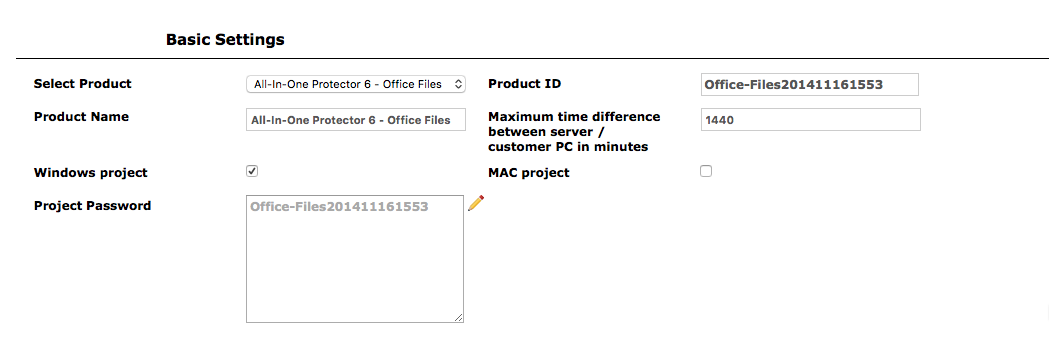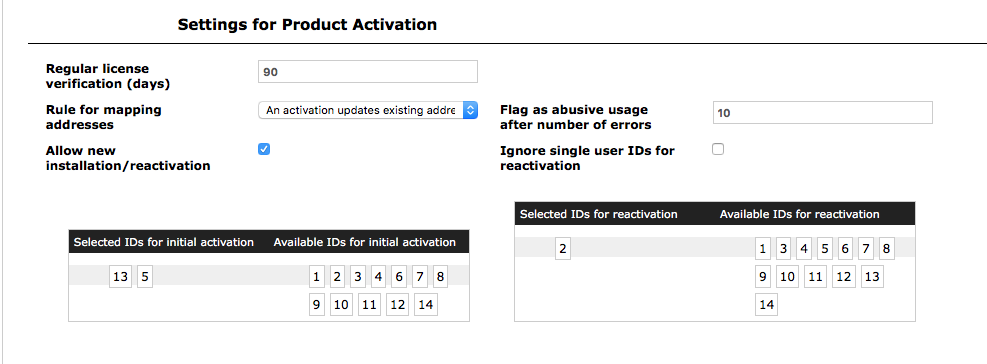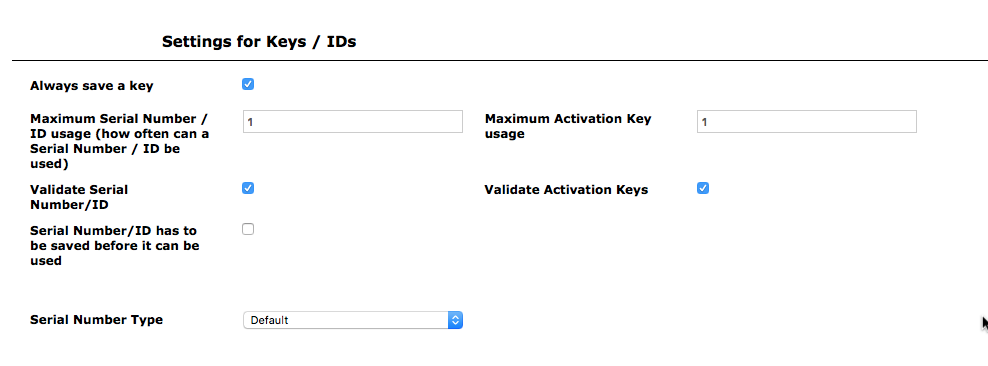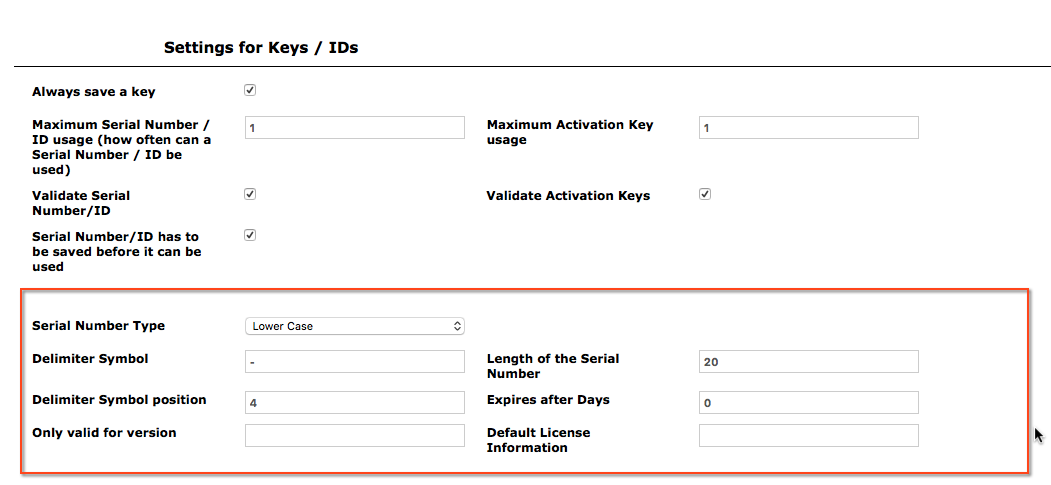
Activation Server 5
Menu item: Administration / Setup - Product Configuration
Use this page to configure your products.
The product configuration is automatically uploaded if you use the TAB Activation Server, Update project on the Activation Server within Licence Protector application.
This option allows you to overwrite the default settings and fine tune your product settings.

Be careful when changing values as same values have instant impact on product activations.
After changing a value, you have to Restart the Activation Server.
Basic Settings

Product Name
This name is displayed in reports or product screens and should be the full product name including version number like E-Learning made Easy 2
Windows project
This project is configured for Licence Protector Windows.
MAC project
This project is configured for Licence Protector MAC.
A project can share settings and keys for Windows and macOS - details see configure a MAC project
Maximum time difference between server / customer PC in minutes
Every connection to the Activation Server 5 compares the server time with the time on the local computer. If the time on the local computer is different (e.g. the user turned back the system date) the activation will fail.
This value defines the maximum difference between server time and local PC time. The default value is 1 day (1440 minutes).
Project Password
The project password is used to encrypt the connection to the Activation Server 5. It has to be set in the Windows and MAC project template. If no password is set, then a default password is used.
The minimum length is 20 characters

Never change this password for projects which are already gone live as activations would fail.
Settings for Product Activation

Regular license check (days)
Defines the interval in days a regular license check is done to validate the license. This option has to be enabled in the application. The regular check allows to lock a license even after the product was activated.
Rule for mapping addresses
Define the rule how existing address information is updated.
•An activation updates existing address information
•Never overwrite existing address data (this is recommended if you add or import the address information)
•Always create a new address
Flag as abusive usage after number of errors
If an activation or license validation fails several times for a key / ID, this key is automatically flagged as - abusive usage. An online validation of the same key which had a valid product activation before or a reinstallation on the same computer will still work.
However a key usage which results in an error like key was already used will generate an unknown error (code 16384). The idea is that the Activation Server 5 can automatically detect, if someone spreads a key / ID through the Internet and the usage of this key will generate unknown errors during product activation.
Locking a key will completely stop the usage of the key (e.g. also a valid product activation would be locked with the next online validation) while marking the key with abusive usage will affect only misused keys.
A key with the abusive usage flag set will be displayed in lists with the icon  .
.
You can manually change the flag for each key within the key details screen.
Allow new Installation / Reactivation
In case the user should be able to reinstall the software on the same computer, define the hardware IDs which should be used to identify a computer. The IDs from the product activation will be compared with the IDs of the new activation request.
This option is only activated if Allow new installation / reactivation is checked.
Details see chapter Copy Protection and Reactivation
Selected IDs for initial activation
Define the hardware IDs which should be used for copy protection. Just click on an ID in the column available IDs and drag it to the column Selected IDs. Setting in .config file: InstCodeType1-n
The first hardware ID will be used. Only if the first hardware ID is not available, the second ID will be used.
Details see chapter Copy Protection and Reactivation
Settings for Keys / ID

Always save a key
Each key, which is created, is saved in the database. Should always be enabled.
Maximum Serial Number / ID usage
Defines the default value how often a Serial Number / ID can be used. The value can be changed for each Serial / Number either when creating a Serial Number / ID or by editing the Serial Number / ID.
Maximum Activation Key usage
Defines the default value how often an Activation Key can be used. The value can be changed for each Activation Key either when creating a Activation Key or by editing the Activation Key.
Validate Serial Number / ID
Enables the check, how often a Serial / ID can be used. Should always be enabled.
Validate Activation Keys
Enables the check, how often an Activation Key can be used. Should always be enabled.
Serial Number has to be saved before it can be used
Check this option if an key / ID should only be accepted, when it is stored in the Activation Server 5 database. This is e.g. required for the MAC version or if you use own custom keys. This option also allows to lock a key before it is used. If you want to use this option, create keys using the Activation Server 5. As an alternative, key lists can be imported.
Serial Number Type
By default, Licence Protector keys with a special structure are used. A key can contain a lot of information like module, number of computers, expiry date, demo version etc.
You can use custom keys, e.g. to make the keys more readable or to have shorter keys. You have to enable this feature in your application before you can configure it. Custom keys are only available for certain projects, e.g. single user installation and perpetual license. The feature is not available for All-In-One Protector.
Default
The Licence Protector key structure is used. Only change that value if you enabled in the project.
Digits
The keys will only include digits 0 to 9
Lower case
The keys will only include lower case characters
Upper case
The keys will only include upper case characters
Lower case and digits
The keys will include lower case characters and digits
Upper case and digits
The keys will include upper case characters and digits
Once a non default option is selected, new configuration options appear.

Delimiter Symbol
A symbol to structure the key in several parts. Typically used is - character
Delimiter Symbol position
The position where the delimiter symbol is placed and it will be repeated
Only valid for version
Option not yet supported
Length of the Serial Number
Defines the length of the Serial Number without delimiter symbols
Expires after Days
Option not yet supported
Default License Information
Option not yet supported
This would be a key generated with the settings used above. Only lower case letters, a - sign after 4 letters, 20 lower case letters
cbim-raxg-nsul-tvcq-ijln
Settings for License Files

This feature is only available for License Protector Windows. Check the software development SDK how to use the options.
The license file administration is available in the menu Data Management, License file
Allow multiple license files per ID
Multiple license files can be uploaded per ID
License file upload overwrites server license file
•If checked, the license file on the Activation Server 5 would always be overwritten
•If unchecked, the license file on the Activation Server 5 would not be overwritten if changes had been made since the last license file download
License file default name
Name which is used if no file name was specified in the license file upload command
